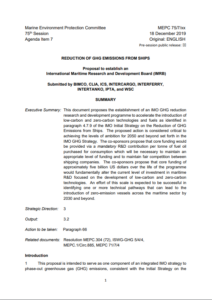Shipowner associations representing the global maritime transport industry submitted a proposal to the IMO to form the world’s first collaborative shipping R&D programme for pushing work of CO2 emissions reduction from international shipping. The proposal includes core funding from shipping companies across the world of about USD 5 billion over a 10-year period.
Rapid decarbonization is vital for the world to achieve the Paris Agreement’s climate change goals, also for international shipping which accounts for approximately 2% of the world’s anthropogenic CO2 emissions.
As such, the eight international groups, including BIMCO, Cruise Lines International Association, INTERCARGO, INTERFERRY, ICS, INTERTANKO, International Parcel Tankers Association, World Shipping Council, are proposing the establishment of an International Maritime Research and Development Board (IMRB), a non-governmental R&D organisation that would be overseen by IMO Member States.
Highlights of the proposal:
- A new non-governmental Research & Development organisation to pave the way for decarbonization of shipping.
- Core funding from shipping companies across the world of about USD 5 billion over a 10-year period.
- To accelerate the development of commercially viable zero-carbon emission ships by the early 2030s.
As explained, the move to accelerate R&D is necessary to ensure the ambitious CO2 reduction targets agreed to by IMO Member States in 2018 are met.
These ambitious IMO targets include an absolute cut in the sector’s total greenhouse gas emissions of at least 50% by 2050, regardless of trade growth, with full decarbonisation shortly after.
The 2050 target will require a carbon efficiency improvement of up to 90%, which is incompatible with a continued long-term use of fossil fuels by commercial shipping.
Meeting the IMO GHG reduction goals will require the deployment of new zero-carbon technologies and propulsion systems, such as green hydrogen and ammonia, fuel cells, batteries and synthetic fuels produced from renewable energy sources.
These do not yet exist in a form or scale that can be applied to large commercial ships, especially those engaged in transoceanic voyages and which are currently dependent on fossil fuels.
In this respect, the IMRB will be financed by shipping companies worldwide via a mandatory R&D contribution of USD 2 per tonne of marine fuel purchased for consumption by shipping companies worldwide, which will generate about USD 5 billion in core funding over a 10-year period.
$2 a tonne will generate about 5 billion dollars over a ten year period – based on total fuel consumption by the world fleet of about 250 million tonnes per year – which we believe should be sufficient to accelerate the intensive R&D effort we need to fully decarbonise our sector within the ambitious timeline agreed by IMO,
…noted Simon Bennett, Deputy Secretary General International Chamber of Shipping.
This USD 5 billion in core funding over a 10-year period generated from the contributions is critical to accelerate the R&D effort required to decarbonise the shipping sector and to catalyse the deployment of commercially viable zero-carbon ships by the early 2030s.
Although the R&D programme and its funding is an initiative of the leading international shipowners’ associations, additional stakeholders’ participation is welcomed.
A global fund can be established quickly, and the shipping industry is confident that other stakeholders will also want to contribute, potentially generating substantial additional funding for R&D.
In a proposal to the IMO, the industry has set out details for governance and funding of the coordinated R&D programme, which can be put in place by 2023 via amendments to the existing MARPOL.
The shipping industry’s proposal will be discussed by governments in London at the next meeting of the IMO MEPC in March 2020.
The shipping industry must reduce its CO2 emissions to meet the ambitious challenge that the International Maritime Organization has set. Innovation is therefore vital if we are to develop the technologies that will power the 4th Propulsion Revolution. This proposal is simple, accountable and deliverable and we hope governments will support this bold move,
…added Esben Poulsson, Chairman International Chamber of Shipping.
We must not leave it to others to carry the burden of addressing the climate crisis. Nor will we ask others to decide the future of maritime. We embrace our responsibility, and we ask the world’s governments to support our efforts,
…said Guy Platten, Secretary General International Chamber of Shipping.
You may find the submission herebelow:


































































